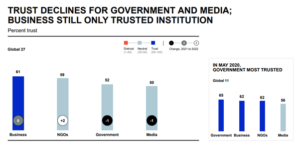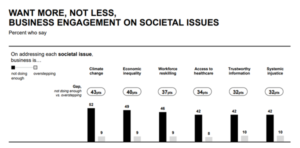
By Claire Contri, Markets Editor at The London Financial
- Published as part of our ‘Deep Dive’ Section, promoting in-depth pieces which analyse underrepresented issues and challenge conventional narratives.
Have you ever heard of the designation “purpose-led company”?
A company whose reason for existence relies on taking purpose from an idea to a plan of action and leveraging core business activities to address material and meaningful societal issues?
Today, more and more companies wish to have an impact. When I say impact, I mean commitments and actions that benefit a company’s environment.
The impact could be financial, social, societal, or/and environmental. But remember that its goal must always be to contribute to the betterment of a third-party indirectly related to the company.
But why should a company not simply focus on its financial returns?
People Trust Companies More Than Governments
The Edelman Trust Barometer aims to study the influence of trust across society. It is based on an annual global survey of more than 36,000 respondents in 28 countries. The report is published in January every year. It covers a range of timely and important social indicators of trust among businesses, media, government, and NGOs, shaping the conversation and setting the agenda for the year ahead.
According to the 22nd edition of the Trust Barometer Global Report, 61% of people trust businesses more than institutions, ahead of NGOs (59%) and governments (52%). Note that in 2020, the government was the most trusted institution before businesses.

As the world is now facing multiple crises and trust is collapsing in the world’s major democracies, it is now proven that companies have been given by people a higher responsibility for their actions. According to the same report, 58% of people buy from brands based on their beliefs and values, and 60% prefer a place to work on the same basis.
Most importantly and most surprisingly, 88% of institutional investors put the same critical attention towards ESG as operational and financial considerations.

Finally, this report also shows people’s eagerness to see businesses become a force for action and address thematic issues such as climate change, economic inequality, and trustworthy information.
In most cases, most respondents believe companies need to do more on these matters.
Business As A Force For Good
We know it now: People have put high expectations on companies to deliver social and environmental returns, not only financial. Nowadays, we can see a shift in how stakeholders assess a company’s performance. When I mean stakeholders, I consider businesses, consumers, partners, suppliers, and governments.
In France, for instance, the 2018 “Loi Pacte” modified the Civil Code so companies can include a purpose, a “Reason To Be,” in their statutes. The concept of “Reason To Be” gained visibility in the French public debate following its appearance in the report “The company, object of collective interest,” drawn up under the supervision of Jean-Dominique Senard, then president of the Michelin group, and Nicole Notat, then president of Vigeo-Eiris. What is the goal of such a law? A legal statement to prove the need to adapt capitalism and bring together better the particular interest of a company and the general interest.
In the US, the importance of a purpose in guiding a company’s strategy was highlighted by Larry Fink, CEO of the investment fund BlackRock, in his 2019 annual letter to business leaders, “Purpose & Profit”: “When a company truly articulates and understands its purpose, it operates with the focus and strategic discipline that produces long-term profitability. Purpose unifies management, employees, and communities. It guides ethical behaviour and creates an essential safeguard against actions that go against the interests of stakeholders”. In the same letter, he says BlackRock will now focus on how the companies the fund invests in build purpose into their strategy.
Furthermore, The Business Roundtable, an association whose members are the leaders of large American companies, has also expressed interest in the question of meaning and purpose. In August 2019, it published a statement signed by 181 business leaders stating that the purpose of a company, which cannot be limited to the sole pursuit of profit, must take into account all the stakeholders who may be affected by its activity: customers, employees, suppliers, communities, and shareholders.
The B Corp Movement
A business can show its commitment to improving the world in many ways. One way is going through the B Corp certification process to become an official “B Corporation.”
The B Corp Movement is a global movement enhanced by the non-profit B Lab, comprising large and small companies working to redefine capitalism as we know it. They’re all working towards a common goal of transitioning to an economic system that is equitable, regenerative, and inclusive.
Certified B Corporations are companies verified by B Lab to meet high social and environmental performance standards, transparency, and accountability. To become a B Corp, companies must pass the “B Impact Assessment” and achieve a verified total score of 80+ points. The assessment comprises 200 questions measuring a company’s impact on 5 Impact Areas: Governance, Workers, Environment, Community, and Customers, which cover different policies and practices.
“B Corp” stands for Benefit Corporation, although it is distinct from the legal designation as a benefit corporation. A benefit corporation states in its approved bylaws that it is committed to improving society, the community, and the environment and turning a profit. Declaring as a benefit corporation does not mean that the company has to conduct a specific type of business, only that it considers its employees, customers, community, and the environment when making business decisions. Hence, all certified B corporations are benefit corporations, but not all benefit corporations are certified B corporations. Their directives are the same, although specifics differ from company to company. The certification and validation from a third party set certified B corporations and benefit corporations apart.
Today, there are more than 5 000 B Corps worldwide, across 158 industries in 86 countries, with over 500 000 workers.
Governments and nonprofits cannot solve societies’ most challenging problems alone. By harnessing the power of business, B Corps “commit to positively impacting all stakeholders – workers, communities, customers, and our planet.”
Pioneer Companies: The Example Of Patagonia
Many companies have understood this impact revolution. They are reinventing their model to contribute to a better world.
To go further, some companies have become purpose-led companies, such as Danone, Banque Postale, or Groupe Rocher. Other companies like Patagonia, Natura & Co, Chloé, Triodos Bank, Etsy, and Ben & Jerry’s have chosen the B Corp certification. They affirm their desire not to be the best businesses in the world but to be the best businesses for the world. Of course, not all companies will become B Corp or purpose-led. But all of them are moving forward on this path, whether big or small.
In 2022, Patagonia published a statement where the company committed to donating all future profits towards protecting the planet.
What does this mean? That means that the company’s ownership has been transferred to two charitable trusts: the Patagonia Purpose Trust, and the Holdfast Collective, allowing profits not required to be reinvested into running the business to go directly towards fighting the effect of climate change.
The company insists that instead of “going public,” they’re “going purpose.” That means that instead of extracting value from nature and transforming it into wealth for investors, Patagonia is using its wealth to protect the source of all wealth: nature.
Yvon Chouinard, the founder of Patagonia, declared in an open letter following the news: “Despite its immensity, the Earth’s resources are not infinite, and it’s clear we’ve exceeded its limits. But it’s also resilient. We can save our planet if we commit to it.”
Executive members’ decision to “give their company to planet Earth” shows the company’s deep commitment to safeguarding the environment and the authenticity of aligning values with actions. Patagonia embodies the definition of being a purpose-led business. We can’t ignore either that founder Yvon Chouinard is a billionaire. Still, the authenticity comes from his commitment to giving back and to his values instead of financial growth.
It is the first time a company has decided to make Earth its “only stakeholder.” It is a powerful and meaningful moment in business history and a potential example for other businesses to follow.
Earth is now our only shareholder
Environmental, social, and governance (ESG) issues represent critical challenges for society. They have become particularly salient since the COVID-19 pandemic, which has forced corporations to scrutinize their responsibilities and role in society. Consumer expectations are becoming more and more pressing. The time is now for action. Companies must reinvent their model, create meaning and thus demonstrate their contribution to society. Only companies with a positive impact will prosper because they are chosen by employees, consumers, partners, and investors. Here is our takeaway for 2023: we can change the world by changing the way we consume and invest. The power is in our wallets. Use this power wisely.
Claire is a French-American Senior at ESSEC Business School in France. She has already done several internships in finance and loves writing articles. She also has a strong interest in sustainable finance and firmly believes that business can be a force for good and lead to positive change. Claire also serves as the Editor-In-Chief of The London Financial. Last but not least, she enjoys meeting new people from different backgrounds and experiences the most!

Fascinating article!
An impressive share, I just given this onto a colleague who was doing a little analysis on this. And he in fact bought me breakfast because I found it for him.. smile. So let me reword that: Thnx for the treat! But yeah Thnkx for spending the time to discuss this, I feel strongly about it and love reading more on this topic. If possible, as you become expertise, would you mind updating your blog with more details? It is highly helpful for me. Big thumb up for this blog post!
I¦ve recently started a website, the info you provide on this website has helped me greatly. Thanks for all of your time & work.